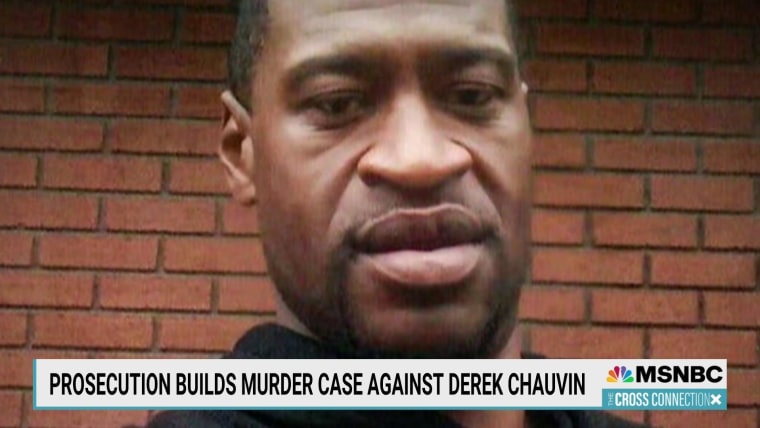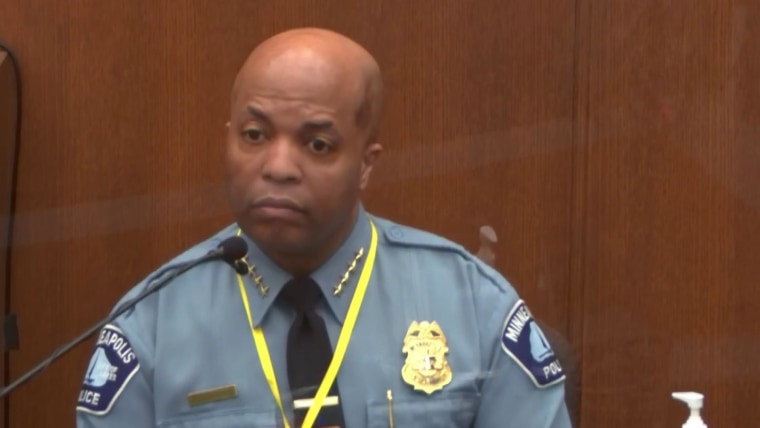During his lengthy testimony Monday, the chief of the Minneapolis Police Department minced no words in condemning the actions of Derek Chauvin, the former officer who is charged with murder in the death of George Floyd.
“To continue to apply that level of force to a person proned out, handcuffed behind their back, that in no way, shape or form is anything that is by policy,” Chief Medaria Arradondo said. “It is not part of our training, and it is certainly not part of our ethics or values.”
Arradondo’s testimony should have come as no surprise. In his opening statement, prosecutor Jerry Blackwell told jurors Arradondo would not hold back in his assessment that when Chauvin knelt on Floyd’s neck for 9 minutes, 29 seconds last May, he used “excessive force.”
Still Arradondo’s testimony was rare. That he was joined by a string of law enforcement officers was remarkable.
Among those joining Arradondo on the stand as prosecution witnesses were Lt. Richard Zimmerman, the longest-serving police officer in the Minneapolis Police Department, and Inspector Katie Blackwell, who at the time of Floyd’s death was the commander of the training division.
Chauvin’s former supervisor, Sgt. David Pleoger, also admonished his actions. Pleoger testified Thursday that, among other things, when Floyd “was no longer offering up any resistance to the officers, they could have ended their restraint” and that Chauvin did not initially divulge that he knelt on Floyd’s neck.
Arradondo, Zimmerman, Pleoger and Blackwell did not protect Chauvin behind the so-called blue wall of silence for various reasons, legal experts say. The “blue wall of silence” is a term used to describe an unofficial oath among police officers not to report a colleague’s wrongdoing, including crimes.
Paul Butler, a law professor at Georgetown University Law Center, said the blue wall means “that sometimes police officers close rank and — right or wrong — they’re blue.”
Many times when police officers are charged with killing someone, it is because they shot that person, said Butler, who is also a contributing columnist for The Washington Post and an MSNBC legal analyst.
“The act of shooting someone requires a split-second decision,” he said.
In those instances, police officers might be reluctant to testify against a colleague in part because they resent being second-guessed by people who don’t know the dangers of their profession, Butler said in an interview Wednesday.
Chauvin’s restraint of Floyd, however, was measured, Butler said.
“He had 9 minutes and 29 seconds to consider his actions,” he said.
The international protests against racism and police brutality spurred by Floyd’s death also may be a reason why the blue wall of silence has crumbled in this case, Butler said.
“I think the officers who are testifying want to model what good cops look like, both for the jury and the public in contrast to Chauvin,” he said. “I’ve been impressed by how many officers are willing to go on the record about how Chauvin violated both police procedures and criminal law.”
On Friday, Zimmerman made a series of damning statements about Chauvin’s actions last May.
“Pulling him down to the ground facedown and putting your knee on a neck for that amount of time, it’s just uncalled for,” said Zimmerman, who joined the department in 1985 and leads its homicide unit.
Zimmerman responded to the scene after Floyd was taken away in an ambulance. He testified that what Chauvin had done was “totally unnecessary.” He said he saw “no reason for why the officers felt they were in danger — if that’s what they felt — and that’s what they would have to feel to be able to use that kind of force.”
His testimony was compelling, Butler said, because police witnesses are often reluctant to draw conclusions like that because they either don’t want to be part of getting an officer convicted or they want the jury to make the determination about whether the force was excessive.
That hasn’t been the case for some of Chauvin’s former colleagues.
Arradondo, the city’s first Black police chief, also testified in the trial of Mohamed Noor, a former police officer who was accused of murder in the fatal shooting of Justine Ruszczyk Damond, who had called the police to report hearing what she thought was a sexual assault of a woman in an alley behind her home. Noor was convicted of third-degree murder.
DeLacy Davis, who retired as a sergeant with the East Orange Police Department in New Jersey in 2006, said it is rare for a police chief to testify against an officer in a criminal case.
Davis, a use-of-force and community policing expert, said he believes there are three reasons why Arradondo testified against Chauvin, the first being that Chauvin’s actions were “egregious.”
Davis said that was evidenced by how quickly Arradondo fired the four officers involved in Floyd’s arrest. They were fired May 26 — a day after Floyd’s death. Typically, Davis said, police chiefs will wait weeks or months to discipline officers for alleged misconduct — if they do at all — and in most cases, it is only after facing public pressure.
The second reason why he believes Arradondo testified was to bolster morale within the police department.
“To also support the men and women who are still working in Minneapolis but have to somehow pick up their morale and re-center their practice as professional law enforcement officers, he needed to send a very clear message,” Davis said. “And I think he did that.”
Davis said Arradondo did not “condemn all of policing; he condemned the actions of the four involved officers.” Davis quoted a statement Arradondo issued in June in which he said Floyd’s death was a “murder” that one of the responding officers had caused and the three “others failed to prevent.”
Davis, who is Black, believes race also influenced Arradondo’s decision to testify.
“Being a police chief of color, he has clearly demonstrated either the unwillingness or the inability to detach his melanin from the reality of what Black and brown people experience at the hands of law enforcement in this country,” Davis said. “Because my experience has been, even with Black officers, they’ll toe the company line.”
Davis believes the Minneapolis police officers who condemned Chauvin’s actions in their testimony did so because they were “indefensible.”
“They could not defend it without shaming their entire agency,” he said.
Floyd, who was Black, had been accused of using a fake $20 bill to buy cigarettes at a convenience store. He was recorded on widely seen bystander video handcuffed, facedown on the pavement telling the officers he couldn’t breathe.
Inspector Katie Blackwell, who took the stand Monday, said she has known Chauvin for about 20 years and that he had received annual training in defensive tactics and use of force. She said he would have been trained to use one or two arms — not his knee — in a neck restraint.
After the prosecution showed her a photo of Chauvin with his knee on Floyd’s neck, she said, “I don’t know what kind of improvised position that is.”
Chauvin’s attorney, Eric Nelson, has argued that Floyd’s use of illegal drugs and his underlying health conditions caused his death, not Chauvin’s kneeling on him, as prosecutors have said.
The county medical examiner’s office classified Floyd’s death a homicide — a death caused by someone else. The report said Floyd died of “cardiopulmonary arrest, complicating law enforcement subdual, restraint, and neck compression.” Under “other significant conditions” it said Floyd suffered from hypertensive heart disease and listed fentanyl intoxication and recent methamphetamine use. Those factors were not listed under cause of death.
Davis said he does believe Floyd’s death was the result of a split-second decision.
“I believe Derek Chauvin made a split-second decision that George Floyd was not worthy of any of the basic humanity that he was pleading for,” he said. “I hope this is a tipping point in law enforcement that we are now seeing officers of many races speaking up and speaking out.”
Source: | This article originally belongs to Nbcnews.com











